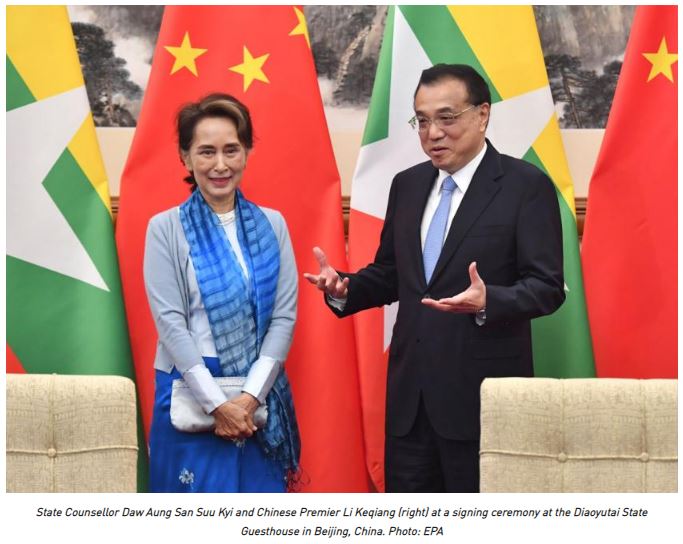Myanmar, China to collaborate on infrastructure, technology
State Counsellor Daw Aung San Suu Kyi signed two Memorandums of Understanding (MoU) and one agreement with China on April 25, according to the Ministry of Information.
The two MoUs and agreement were signed during a meeting between Daw Suu and Chinese Premier Mr. Li Keqiang during the Second Belt and Road Forum for International Cooperation in Beijing.
U Set Aung, Deputy Minister of the Ministry of Planning and Finance, signed an MoU to cooperate on the China-Myanmar Economic Corridor with Zhang Yong, Vice Chairman of the National Development and Reform Commission from China.
The second MoU, which outlines a five-year collaboration between both countries for the development of trade and the economic sector, was signed between Myanmar’s Ministry of Investment and Foreign Economic Relations and Vice Minister Yu Jianhua from China’s Ministry of Commerce.
The two governments also discussed collaborating more on infrastructure and technology in the e-government sector.
The State Counsellor and the Chinese Prime Minister also discussed ways to promote collaboration on Myanmar’s transport-related infrastructure development under the Belt and Road Initiative, raising Myanmar’s current 100,000-tonne rice export quota and China buying more of Myanmar-produced agriculture goods and livestock in the future.
The leaders also discussed cooperating to prevent illegal trade and human trafficking at the border but did not touch on the US$3.6 billion, 6000MW Myitsone dam, which is backed by China’s State Power Investment Corporation and suspended by then-President U Thein Sein in 2011 owing to widespread domestic opposition.
During the forum, Daw Suu stressed the need for better connectivity between the people of Myanmar and China, saying better cooperation on the education, tourism, culture and business.
“The field of tourism can also enhance mutual understanding and provide substantial foreign capital inflow and employment opportunities. It can also contribute to greater harmony and peace between diverse societies. We could work together to promote tourism by facilitating tourist safety and security measures, easing visa regulations for tourists, and fostering socially, culturally, and environmentally sustainable tourism,” Daw Suu said.
“We should keep in mind that the business sector could also play a valuable role in fostering people to people connectivity through social and environmentally responsible enterprises,” she said.
Source: https://www.mmtimes.com/news/myanmar-china-collaborate-infrastructure-technology.html


 Thailand
Thailand




